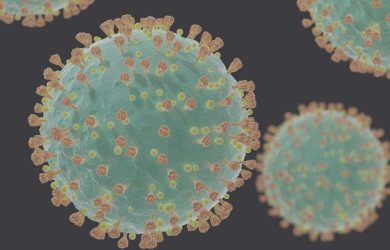Kevin Grove grew up working on a family farm outside a small village in Montana. He says he would sit on his harvest truck aged nine or 10 and read the National Geographic magazine or biographies from school or the barber’s shop while the harvesting machine was going round the field. Many of the books had been donated to him because local people knew how much he loved to read. “I always had a big appetite for learning,” he says.
So much so that he was not content just to do one undergraduate degree. He did three – simultaneously. His passion for learning was combined with his desire to help people and eventually he combined the two by entering a branch of the Catholic religious life which places an emphasis on education.
Kevin describes his childhood as very family oriented. He was the oldest of three children and the family had worked on the farm and ranch for generations, growing wheat and farming cattle and sheep. “We would work together during the agricultural season to grow and harvest the grain and enjoy the mountain beauty,” he says. “I would also go fishing, hiking and camping in the mountains.”
He attended the local school from kindergarten to high school. “I walked the same hallway for years,” he laughs. There were only 12 students in his graduating class.
His parents encouraged his passion for learning and indeed he is the first university graduate in his family. “They placed a high premium on education,” he says and encouraged him to get experience of different places, ensuring he attended several national conventions while at high school.
He obtained a Sullivan leadership award scholarship to study at Seattle University. However, one degree was not enough for him. He decided to do three – English literature, history and philosophy – and he also minored in medieval studies. “I realised the interconnections between the three disciplines through the great books programme at Seattle. They all deal with human problematics in time, in, for instance, poetry, historical writing about culture and in the history of ideas,” he says. “I wanted to get that broader perspective.”
As an undergraduate, he grasped opportunities to further his education and do active service abroad or in politics. Being from a Catholic family, he had thought about becoming a priest, but at different points in his life had considered other possibilities. One summer he was an intern in the senate, for instance. At university, he went twice to Mexico to work on and eventually lead a project house-building project. He also visited a maximum security prison; travelled to Canada to study ancient languages; travelled to Italy and also to Oxford where he studied Elizabethan culture.
He says his stint in the senate confirmed his desire to do some form of service, but he eventually decided that this would be in the priesthood rather than politics. He says: “I took a vow of poverty and lived simply, investing all my time and resources in my work. I believe there is something appealing and radical that underscores the call to service.”
He joined the Congregation of the Holy Cross on graduation. He says he was drawn to its focus on internationalism and education. His order works as far afield as Bangladesh and East Africa on Church work. His seminary years were spent doing a masters course in divinity at the University of Notre Dame. He also spent a year living in the mountains in Colorado, reflecting on whether the spiritual life was the one for him. “It was the most monastic year of my life as my religious life now is very active,” he says. His work has included a stint in a crisis counselling centre and working in a homeless shelter in Phoenix.
He is now working as a parish priest in Indiana. He works with 1,200 families at a local school.
Because the Holy Cross is an order of educators, they are keen to encourage their priests to continue with their studies.
While he has been working as a priest he has done a lot of work on issues of memory and forgiveness, the themes he wants to research for his PhD in Divinity at Cambridge, have particular poignancy. “They play a significant role in reconciliation,” he says. He wants to work with a broad range of people who are interested in reconciliation, including policymakers and writers and to study ancient philosophical concepts of “how communities can draw an event from the past forward and transform it in the present so enabling forgiveness”.
Kevin decided to apply to Cambridge after meeting his future supervisors at the Faculty of Divinity. He says he was very impressed. “At my Gates interview the panel were interested in my work as a priest as well as my academic work and how the two could be merged in a way that served the community,” he says. “It is not a combination that I think they were used to seeing too often. They were interested in how my proposal, while being grounded in Catholic tradition, had very broad ramifications and was not just about one particular perspective.”
Kevin’s background in several different humanities subjects as well as his experience as a priest, for instance, counselling people who were grieving, means he has a very broad base to draw upon.
He hopes that being a Gates scholar will enable him to broaden his perspective still further, through meeting stimulating people from many different places and disciplines. He is looking forward to life at Cambridge too. “It’s a very beautiful place – very stimulating and active,” he says.












